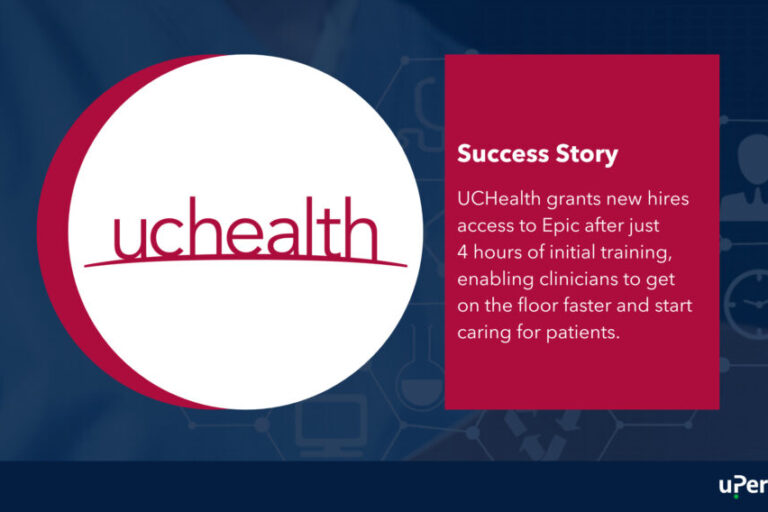Like many healthcare organizations, Aspirus Health found itself growing rapidly around the time that COVID-19 changed the healthcare landscape. Rachel White, MBA, BSN, RN, Manager for System Technology Educators – Clinical Informatics at Aspirus, has personally witnessed the health system grow from 10 hospitals with 50 clinics to 17 hospitals with 75 clinics in just a handful of years. With another merger in the works, Aspirus will soon add two more hospitals and 40 more clinics.
As an EHR education leader, White has had to find creative ways to deliver quality onboarding and ongoing Electronic Health Record (EHR) training to a growing user base without expanding her training team. With the help of the uPerform just-in-time learning platform, she and her team scaled training to meet the organization’s growing needs, reduced training costs and improved clinician satisfaction with the EHR.
White recently presented at KLAS Research’s 2023 Arch Collaborative Learning Summit showcasing how Aspirus transformed the way they deliver software training. You can view the presentation below.
Aspirus has gone through significant growth and evolution over the years, expanding from a small community hospital to a healthcare system with multiple hospitals and clinics. As their user base increased, they faced challenges scaling Epic training. With limited resources and time constraints, they looked to uPerform to help them create a more user-friendly, accessible training system.
The team at Aspirus first leveraged uPerform to deliver virtual instructor-led training amid a large acquisition in 2021. Using uPerform, they trained 2,500 new Epic users in just five weeks. They were also able to create 575 tip sheets and simulations to further support clinicians once they hit the floor. Despite initial low satisfaction scores, the training strategy has improved over time, with increased user satisfaction and confidence.
White notes the importance of strategic planning and collaboration in digitizing healthcare training. “We all care about our clinicians, we want them to be able to provide safe care to our patients and we want them to enjoy their job. And if they’re frustrated with the EMR, of course, that impacts it,” White said.
Responding to user feedback, Aspirus has worked to expand its virtual training options to include self-paced learning journeys with uPerform’s Learning Pathways, allowing users to work through training materials on their own time. The transition to self-paced learning has freed up training resources and allowed Aspirus to deliver more opportunities for EHR personalization, which has been instrumental in improving overall satisfaction. In one example, the new training format reduced the need to bring in 5,500 Epic users for classroom training, saving significant time and associated costs.
The Aspirus story highlights the impact that virtual training can have on scalability and user satisfaction when delivered effectively. Aspirus’ Epic users who participate in uPerform virtual training report higher EHR satisfaction than those who don’t participate. As Aspirus continues to improve its training strategy, the team plans to expand Learning Pathways to more user groups, continue improving the accessibility of learning materials by further integrating it into Epic and improving its use of data to drive decision-making.
Key challenges of traditional training methods for Aspirus
White and her Aspirus training team were facing multiple challenges when they decided to make the switch to uPerform.
Unprecedented growth and limited training staff: Through mergers and acquisitions, Aspirus grew its user base significantly. However, White and her team were not able to add training team members. This, along with furloughs, put a lot of strain on the training team.
Covid-19 and social distancing: In addition to resource constraints, Aspirus was experiencing the added challenge of not being able to continue offering classroom instruction due to remote work and social distancing requirements.
Access to training materials: As new sites joined the Aspirus system, users often didn’t have access to training materials. This made it difficult to onboard and deliver ongoing training to affiliate partners.
Geographically dispersed: As Aspirus continues to grow its user base, it also continues to grow its geographical reach. When Aspirus was still trying to deliver classroom training, new hires often had to travel up to four hours each way to complete their onboarding. This delayed getting new hires on the floor and added overnight stay and travel costs to the training budget.
Outcomes and takeaways of new training strategy
Aspirus continues to make improvements to its training strategy. But in a short time since their implementation of uPerform in 2021, Aspirus has already witnessed multiple benefits:
- Clinicians feel more efficient with the EHR. Personalization tools are helping increase satisfaction.
- Clinicians with high satisfaction cite training as #1 differentiator in their positive EHR experience.
- The Aspirus training team is better equipped to scale training to meet the demands of acquisitions and new go-lives.
- Aspirus has reduced the time and costs associated with training, particularly regarding travel and accommodations for on-site training.
- Aspirus continues to receive positive feedback about its new self-paced learning format.
The benefits of self-paced EHR training with uPerform
Scalable Epic training with uPerform provides several benefits for healthcare organizations. From improved user experience and satisfaction to cost savings, here are some of the key advantages that uPerform can offer:
-
- Better scalability: Delivering Epic training in a self-paced format frees up training teams, so they can keep learning content up to date and offer more opportunities for EHR personalization, a key driver in satisfaction.
- Engaging learning experiences: With interactive exercises, video tutorials and hands-on practice available to users in their workflow, uPerform offers an engaging and accessible way to learn Epic – helping users retain information more effectively.
- Cost-effective training: By leveraging uPerform, healthcare organizations can reduce costs associated with EHR training and increase efficiency when delivering Epic training materials.
- Content creation tool: uPerform’s content creation tool allows for fast and effective creation and deployment of Epic training courses, microlearnings and more – enabling healthcare organizations to quickly scale up their Epic training efforts as needed.
- Improved user experience & satisfaction: With uPerform’s in-application, role-based delivery, clinicians can get the exact Epic training they need when and where they need it – allowing them to understand how to use the system much faster and with greater confidence. This leads to improved clinician satisfaction with their Epic experience.
Related Articles
Start your uPerform journey today
Interested in learning more about how uPerform can help your organization scale and improve its EHR training? Contact us today to schedule a demo.



















